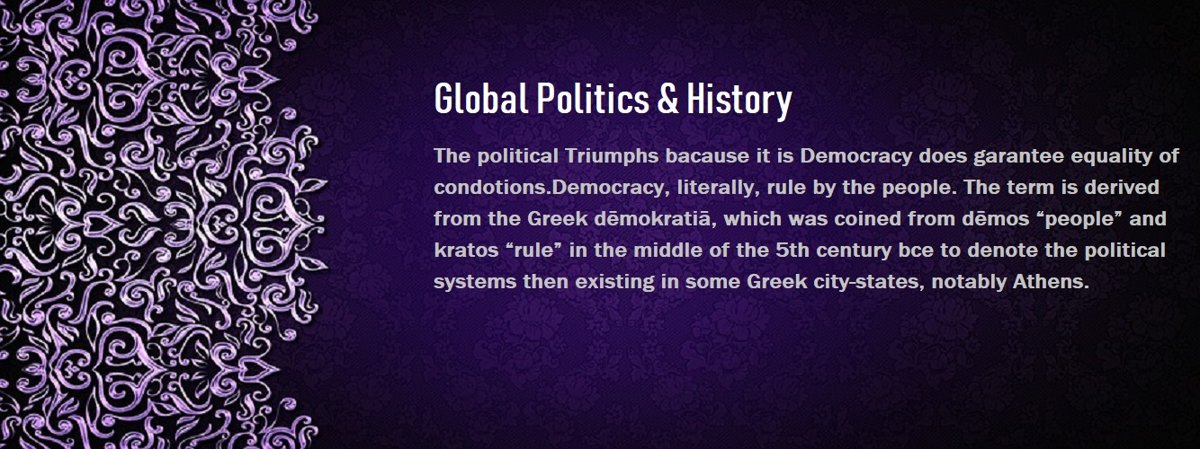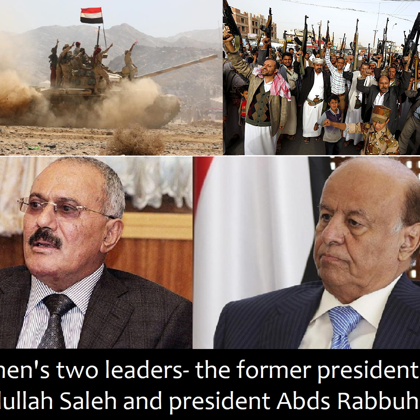YEMEN'S CIVIL WAR ,SINCE 2014,ONGOING CONFLICT BETWEEN GOVERNMENT AND NONGOVERNMENT FORCES HAS PRODUCED A SEVERE HUMANITARIAN CRISIS.A MILITARY INTERVENTION WAS LAUNCHED BY SAUDI ARABIAN UNTIL NOW,LEADING A COALITION OF NINE AFRICAN ,MIDDLE EAT COUNTRIES AND UNITED STATES,TO INFLUENCE THE OUTCOME OF THE YEMENI CIVIL WAR IN FAVOUR OF YEMEN'S PRESIDENT MANSOUR HADI.


 Yemen before civil war,the southern part of the Arabian Peninsula, now known as Yemen, was previously known to geographers as Arabia Felix; a Latin name meaning 'Happy Arabia' or 'Fertile Arabia.Yemen was the first country in the Arabian Peninsula to hold multiparty elections under universal suffrage, which was gained in 1967.Yemen's Shibam, a city in the eastern province of Hadramawt, is known as 'The Manhattan of Arabia' and is a UNESCO world heritage site. The city is home to more than 500 towers that are made entirely of mud brick. The 11-storey towers were the first skyscrapers to be built in the world.
Yemen before civil war,the southern part of the Arabian Peninsula, now known as Yemen, was previously known to geographers as Arabia Felix; a Latin name meaning 'Happy Arabia' or 'Fertile Arabia.Yemen was the first country in the Arabian Peninsula to hold multiparty elections under universal suffrage, which was gained in 1967.Yemen's Shibam, a city in the eastern province of Hadramawt, is known as 'The Manhattan of Arabia' and is a UNESCO world heritage site. The city is home to more than 500 towers that are made entirely of mud brick. The 11-storey towers were the first skyscrapers to be built in the world.
The armed conflict is mainly between the forces loyal to Hadi government and the Houthi forces that support Abdullah Saleh. The Houthi forces are either demanding a new election or the reinstatement of Saleh as the president.Why Saudi Arabia and Iran are involved.Tensions are escalating in Yemen as Iranian-backed Houthi militias and forces loyal to ousted President Abd-Rabbu Mansour Hadi, backed by Saudi Arabia, are “squaring off for battle after months of skirmishes.Iran’s allies are gaining strength on Saudi Arabia’s borders, creating the worst security environment for the kingdom in decades.The Saudis fearing that the country could fall to the Houthis, whom they saw as Shia proxies of Iran, formed a coalition of Sunni Arab states and intervened militarily in Yemen civil war. The threat of ISIS spreading it’s wing so near to the Saudi border also motivated the Arabian Kingdom to opt for armed intervention.The US is helping their traditional ally Saudi Arabia in Yemen civil war and is providing logistical aid.Pakistan has been requested by the Saudis to take part in the multinational armed intervention but the Pakistani parliament has voted against it,at least for now. Hadi has fled to Saudi Arabia and now his bidding is largely being done by the Saudi led Arab coalition. The Houthis have captured large tracts of land but they ill prepared to conventionally thwart a major Saudi Invasion,but that doesn’t mean that the Saudis will have an easy victory over the pro Saleh forces. The Houthis and their allies are capable enough to turn this Yemen civil war into a battle of attrition with their guerilla warfare in the event of a major push by the coalition.Though the chief combatants involve the pro-Hadi and pro-Saleh forces but there exists two others factions- Yemeni branch of Al Qaeda and the forces of the Southern Movement which aim to secede from Yemen and form a new country.The Islamic State also has its affiliates in Yemen. They are against all the other factions, even the Al Qaeda in Yemen. Two suicide bomb blasts in two of saana’s mosques, which were frequented by shias were claimed by the Islamic State. It further polarized the people of Yemen along sectarian lines.The majority of Yemen’s population is Muslim, but it is split into various branches of Islam mainly Sunni or Zaidi Shia. The divisions between the Sunnis and the Shia are based on a long-running religious conflict that started as a dispute about the Prophet Muhammad’s successor.While Shia Muslims believe that the prophet’s cousin should have filled the role, Sunnis support the choice of Muhammad’s close friend and adviser, Abu Bakr, as the first caliph of the Islamic nation.Unlike most places in the Arabian Peninsula, Yemen has historically been quite a tolerant place for other religions—even with the split between Sunni and Zaidi Shia being a point of contention during times of war. For example, though all Houthis are Zaidis, not all Zaidis are Houthi. So the tribe does not speak for the whole religion, and vice versa.Yemen is an ancient country on the very southernmost edge of the Arabian Peninsula, bordering Saudi Arabia, unsurprisingly. The land has changed hands dozens of times over the centuries as empires wax and wane.Even today, it is the site of a vicious turf war between the Sunnis of Riyadh and the Shia of Tehran. Add to this the many different religious sects and tribal loyalties, Yemen has what can only be described as one of the most complicated political histories on the planet.According to the Quran, the queen of Sheba lived in Yemen around the 10th century before Christ. King Solomon invited her to visit him and convert to Judaism, which as a strict Sun- and Moon-worshiping kind of gal perplexed the queen greatly.In a verbatim transcription of what actually happened, the story tells us that Solomon used a djinn to transport Bilqis—for that was her name and her throne all the way from Yemen in a trice.There is another possible claimant on the throne of Sheba from the period when Queen Makeda from the city of Axum went to see Solomon. Being a particularly sexy Jewish king, he impregnated her on the spot, giving rise to the lineage of Solomonid kings that ended with the Haile Selassie in 1974.Still, this story ends up in Ethiopia rather than Yemen, though both modern countries were part of the same empire at the time and still share cultural similarities to this day.However, the truth is, Yemen boasts a rich history, culture and has contributed vastly to the world.In late 2014, as the country’s relatively new president, Abdrabbuh Mansour Hadi, struggled to remedy his country’s challenges, an armed group called the Houthis moved into the capital city, Sana’a, and took over government institutions. Hadi and other senior government officials fled Yemen after the takeover.Shortly after, a coalition of a dozen states, led by Saudi Arabia, launched a military campaign to take back Houthi-held areas and restore power to Hadi’s government. The conflict has only heightened since then as each of the warring parties attempts to gain leverage, leading to widespread destruction, displacement and hunger for millions of innocent civilians. The situation is dire. Yemen imports 90 percent of its food supply but, because of the conflict, many of Yemen's sea ports have been closed, and goods can’t get in easily. Yemen is the largest food emergency in the world. Food is so scarce that 17.8 million people don’t have enough to eat, and 8.4 million are at risk of famine, meaning they could die of starvation. More than 16 million people lack access to clean water and sanitation, because pumps and treatment facilities have been damaged, and there isn’t enough fuel to run the water system. This has exacerbated the risk of disease already a state of emergency has been declared due to an unprecedented cholera epidemic. Yet, more than half of the country’s health facilities have been damaged or destroyed, and limited medicine imports are making it over the border.Additionally, much of Yemen’s critical infrastructure, like the power grid and communication towers, has been impaired. And the economy is on the verge of collapse. Around one-quarter of companies in Yemen have completely closed, and 70 percent of laborers have been laid off.
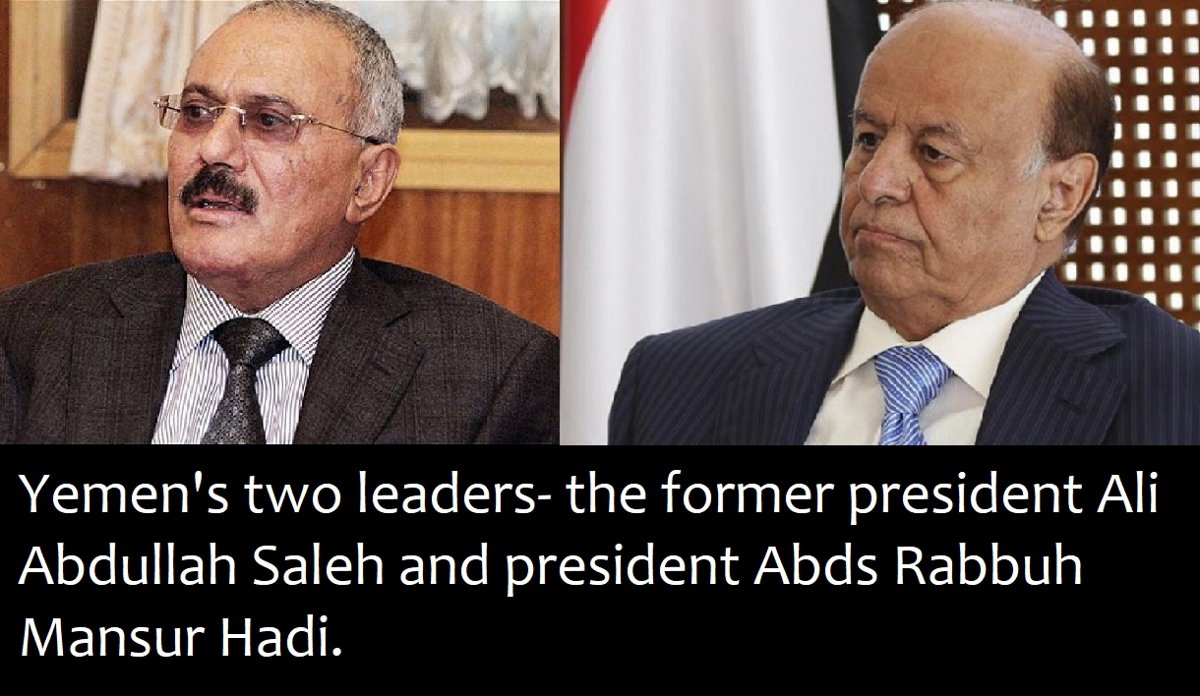 The Yemen crisis started as a conflict between the supporters of two leaders-Abds Rabbuh Mansur Hadi & the former president Ali Abdullah Saleh. The supporters of Saleh rebelled against the ruling Hadi Government and marched on the capital Saa’na.Yemen's ex-president Ali Abdullah Saleh has been killed in Sanaa.
The Yemen crisis started as a conflict between the supporters of two leaders-Abds Rabbuh Mansur Hadi & the former president Ali Abdullah Saleh. The supporters of Saleh rebelled against the ruling Hadi Government and marched on the capital Saa’na.Yemen's ex-president Ali Abdullah Saleh has been killed in Sanaa.The crisis in Yemen, caused by prolonged conflict, has led to staggering impacts on human life, basic public services and the economy. More than 3 million people have been displaced and more than 50,000 people have been killed or injured, including more than 13,000 civilians. Families are struggling to survive, severe outbreaks of cholera and other communicable diseases are ongoing, and the risk of famine looms.Millions of Yemeni people need our help. Today, 22.2 million people within the country are in need of humanitarian assistance, and less than 70 percent of the Humanitarian Response Plan has been funded for 2018. Mercy Corps is there to connect communities with desperately needed resources, but our work is only possible with your knowledge and support.The recent conflict in Yemen has highlighted the role of tribal combatants, which is an error according to the prominent Yemeni political analyst Abdul Ghani al-Iryani. He argued in 2011 that Westerners overestimate the role of tribes in Yemeni politics.Yemen is home to a variety of religions, including Islam, Christianity and Judaism. One of the most iconic buildings in the southern coastal city of Aden is an Anglican church built by the British in 1863.Yemen's Jewish community, who had lived peacefully in the country for more than 2,000 years, were secretly relocated to Tel Aviv by Israeli authorities between 1949 and 1950, in a mission dubbed 'Operation Magic Carpet'. The last remaining Yemenite Jews, now numbering fewer than 50, live under government protection in Sanaa.While on the surface one could consider the Yemen conflict to be a primarily sectarian one of Sunni versus Shia, Saudi versus Iranian, the real picture is far more complex.Many Sunni Yemenis actually sided with the Houthi rebels, so narked off with the post–Arab Spring fiasco were they. Complicating matters are those cheeky lads from Al-Qaeda in the Arab Peninsula (AQAP) who are desperate to show that they are just as good at suicide bombing as any 15-year-old ISIS recruit.So on the one side, you have the Houthis, whose battle standard bears their motto: “God is great, death to America, death to Israel, God curse the Jews. Victory for Islam.” On the other side, you have AQAP, who don’t do so well with the snappy slogans but did blow up the USS Cole in 2000.They have the backing of various Sunni interests in the Middle East but not the Sunnis in Saudi Arabia, whom AQAP want to kill quite a lot. The Houthis also want to kill the Saudis. But despite shooting missiles at Riyadh, they have been unsuccessful so far.On the other-other side stand the Yemeni government forces backed by Morocco, Jordan, the USA, Saudi Arabia, the United Kingdom, and the myriad government-allied tribes who are for the moment interested in killing the Houthis.Communism and Islam make unlikely but surprisingly common bedfellows. Once the tutelage of Messieurs Marx and Engels has been shorn of that inconvenient exhortation to atheism, many groups across the Middle East have taken a stab at using the immortal science in conjunction with the faith.It is admittedly a very hard sell. Still, communists in South Yemen actually pulled off a government for around two decades until the country unified .Not being able to exert control over the reunified Yemeni people, the socialists decided to have a civil war instead in 1994. This war, fought against that old dog Saleh, was a terrible idea.Not only was Saleh backed by the Americans who can always be relied on to arm people fighting communists, but this war took place where the only communist allies the South Yemenis could call on were Cuba and North Korea. Both gave their verbal solidarity against the imperialists.A few months and 6,000 or so dead communists later, President Saleh had a peaceful and unified nation for a little while.Resident of a grave plot in December 2017. After being forced from the throne he had occupied for 33 years during the 2011 Arab Spring, Saleh desperately wanted his job back. After all, he could have kept the job for life, in theory.To reclaim power, Saleh decided to join up with the Iranian-backed Houthi rebels against whom he had fought six wars and it worked, for a while. His successor was forced to flee to Saudi Arabia, and for a short time, things were quite good for Saleh. He once described his job as “dancing upon the heads of snakes.”Then, of course, he remembered that the Houthis are completely barking mad tribesmen who kill for fun and are high on khat all day. Saleh realized that he was right to try and kill every last mother’s son after all and called the Saudis back in.The Houthis took exception to being jilted like an ugly pregnant bride at a shotgun wedding with all the grace you would expect from high people with AK-47s. They hunted Saleh down as he tried to escape and shot him to death. So passed the first and to date, the only democratically elected president of Yemen
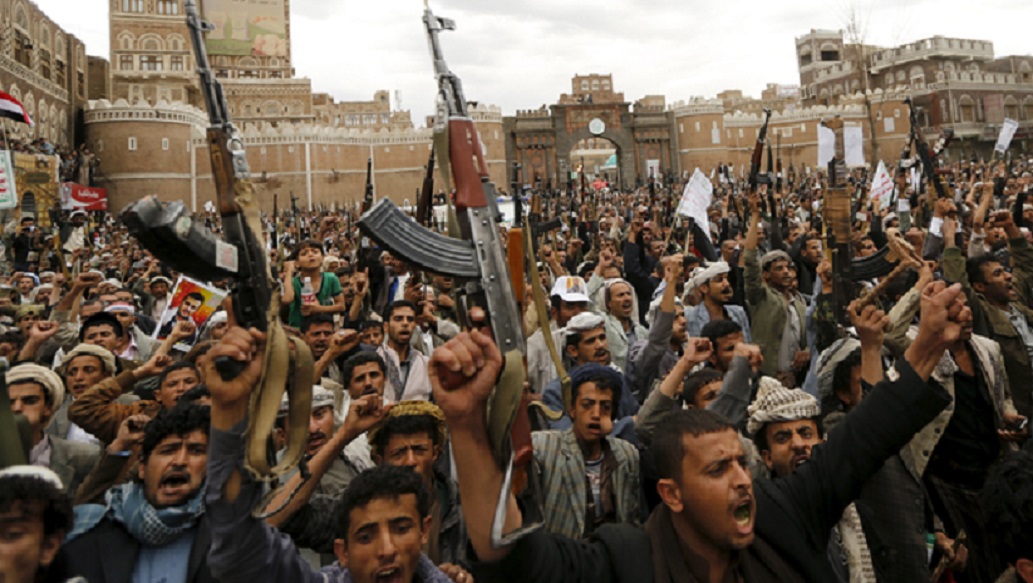 The Saudi-led coalition fighting Houthis in Yemen has accused the Iranian-allied militia group of repeatedly violating a ceasefire and warned the truce could collapse.The Iran-backed Houthis militias have been losing ground as Yemeni forces make sweeping advances towards Hodeidah Houthis based in Yemen’s north and Saudi-backed southern and eastern fighters loyal to President Abd-Rabbu Mansour Hadi.The conflict has strong sectarian underpinnings.The houthis are pre-dominantly shias and the rest of the combatants are chiefly Sunnis. The religious mistrust and sectarian tension has fueled the simmering conflict even further.
The Saudi-led coalition fighting Houthis in Yemen has accused the Iranian-allied militia group of repeatedly violating a ceasefire and warned the truce could collapse.The Iran-backed Houthis militias have been losing ground as Yemeni forces make sweeping advances towards Hodeidah Houthis based in Yemen’s north and Saudi-backed southern and eastern fighters loyal to President Abd-Rabbu Mansour Hadi.The conflict has strong sectarian underpinnings.The houthis are pre-dominantly shias and the rest of the combatants are chiefly Sunnis. The religious mistrust and sectarian tension has fueled the simmering conflict even further.
In 1993, Yemen became the first country in the Arabian peninsula to hold multiparty elections under universal suffrage. Fifty women competed, and two won seats. Since then, the recently deceased President Saleh’s party the General People’s Congress has come to dominate the political scene.next parliamentary elections, which were due in 2009, have been postponed twice. In 1999, Saleh was directly elected as president for the first time. He competed against an obscure member of his own party, paid his opponent’s election expenses, and won with 96.3 percent of the vote.It is not easy being a Yemeni woman. Beyond the oppression of women that is inherent in Islam, there are socioeconomic and cultural factors at play as well. Twenty-four percent of Yemeni women have suffered female genital mutilation (as many as 69 percent in coastal areas), and only one-third of all women in the country are literate.According a report, half of Yemeni girls are married before they are 18 and 15 percent are wed before they are 15. Within their marriages, Yemeni women do not have equal rights to custody, divorce, or inheritance. They also require a husband or father’s permission to travel or get a passport.Legislation was in the process of ratification in the Yemeni parliament. But, you guessed it, the war put paid to the bill and halted the long process of changing the cultural norm of slicing up your daughter’s vagina.If anyone stands to gain from the complete reformation of Yemeni society, it is the women provided that the reformation is not a plunge into more extreme and darker interpretations of Islam and the role of women in society.It is probably not 11 stories tall like some buildings in the Yemeni city of Shibam are. More to the point, Shibam has had skyscrapers like these for 500 years, when most Western countries were still struggling with not dying from dirty water. Shibam was listed as a World Heritage Site in Danger when, you guessed it, the civil war broke out.Still, it’s not just Saudi Arabia, Al-Qaeda, and ISIS who are a threat to this bizarrely beautiful town of 7,000 people. Erosion and typhoon weather systems are an ever-present danger to the mud bricks and foundations, necessitating constant maintenance.The majority of Yemen’s population is Muslim, but it is split into various branches of Islam mainly Sunni or Zaidi Shia. The divisions between the Sunnis and the Shia are based on a long-running religious conflict that started as a dispute about the Prophet Muhammad’s successor.While Shia Muslims believe that the prophet’s cousin should have filled the role, Sunnis support the choice of Muhammad’s close friend and adviser, Abu Bakr, as the first caliph of the Islamic nation.Unlike most places in the Arabian Peninsula, Yemen has historically been quite a tolerant place for other religions even with the split between Sunni and Zaidi Shia being a point of contention during times of war. For example, though all Houthis are Zaidis, not all Zaidis are Houthi. So the tribe does not speak for the whole religion, and vice versa.The recent conflict in Yemen has highlighted the role of tribal combatants, which is an error according to the prominent Yemeni political analyst Abdul Ghani al-Iryani. He argued in 2011 that Westerners overestimate the role of tribes in Yemeni politics.What does this mean? Beyond the conflict between the Houthis and the Yemeni government are a great many people who would like to be left alone and not be bombed. By and large, the tribal folk have suffered historically from being ineffective fighters when faced with competent opponents. Yet, they are quite adroit at guerrilla warfare.Perhaps this mismatch of skills is a reason why the civil war is still ongoing, with the government not quite able to pin down and finish off the tribal warriors.Ninety percent of men and 1 in 4 women in Yemen are estimated to chew khat leaves, which leads to a quite startling experience for the newcomer. Imagine setting foot in Yemen and then realizing that most people have a mouth full of leaves.Yemen rarely makes headlines outside of military action in the country, like the raid that killed a U.S. Navy SEAL. In fact, this devastating humanitarian crisis has, for years, gone largely unnoticed. But the world can’t afford inaction any longer too many lives are at risk.Yemen has been vulnerable for years. Even before the current conflict, around half the population lived below the poverty line, and the country faced chronic instability, weak governance, underdevelopment, unemployment and hunger.![]()
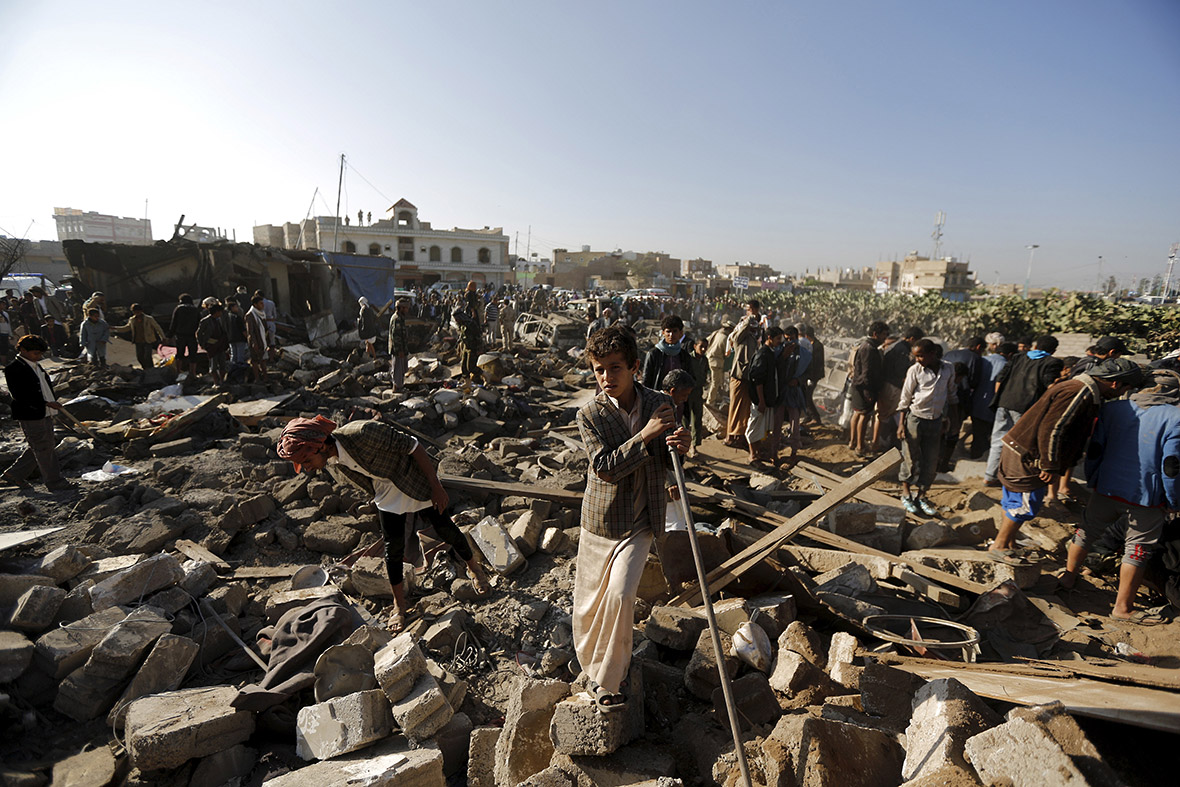 Saudi-led coalition blames Yemeni party for funeral for the bombing weekend of a packed funeral hall in the rebel-held Yemeni capital that killed at least 140 people and wounded some 600.Additionally, much of Yemen’s critical infrastructure, like the power grid and communication towers, has been impaired. And the economy is on the verge of collapse. Around one-quarter of companies in Yemen have completely closed, and 70 percent of laborers have been laid off.The situation is so disastrous that the United Nations says a child under the age of 5 dies every 10 minutes from preventable causes, including hunger, disease and violence.
Saudi-led coalition blames Yemeni party for funeral for the bombing weekend of a packed funeral hall in the rebel-held Yemeni capital that killed at least 140 people and wounded some 600.Additionally, much of Yemen’s critical infrastructure, like the power grid and communication towers, has been impaired. And the economy is on the verge of collapse. Around one-quarter of companies in Yemen have completely closed, and 70 percent of laborers have been laid off.The situation is so disastrous that the United Nations says a child under the age of 5 dies every 10 minutes from preventable causes, including hunger, disease and violence.
